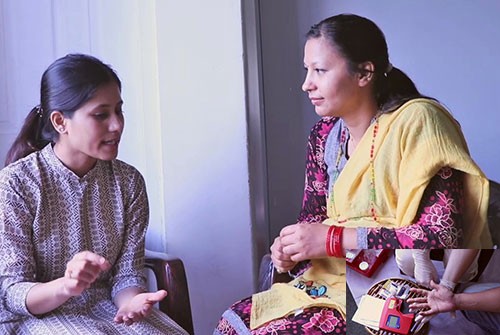Anaemia is prevalent in pregnant and non-pregnant women in Nepal. The prevalence of anaemia is highest in the Terai as compared to other ecological regions. Mostly this is due to iron deficiency but also due to other factors. The Government of Nepal has specific protocols for treating anaemia in pregnancy with Iron and Folic Acid (IFA) supplements as per the anaemia status of the pregnant woman (PW). Recent data from Nepal Health Demographic Survey and Nepal National Micronutrient Status survey(NNMSS) show an increased number of women taking IFA supplements in pregnancy than previously but many women are not taking the recommended numbers. Community-based behaviour-change interventions have been shown to improve maternal and newborn mortality and nutritional outcomes in Nepal. Similarly, home visits for nutrition counselling have been effective in increasing dietary diversity in pregnancy and improving child feeding in India. In the current COVID -19 pandemic context, home visits and community interventions are not feasible. Therefore, the proposed trial is designed to provide virtual counselling and advice on anaemia, the importance of antenatal care (ANC) and IFA intake, and good dietary practices aiming to overcome barriers for behaviour change needed to improve women’s health and IFA consumption during pregnancy.
Primary Objective: To assess whether providing an antenatal virtual counselling intervention to PW increases their compliance with IFA supplementation (compliance defined as consumption of IFA on 80% or more of the days between baseline and end line), compared with women who have access to routine ANC only (control).
Secondary Objectives:
- To identify whether providing an antenatal virtual counselling intervention to PW improves uptake of IFA, dietary diversity score, required ANC visit frequency, deworming tablet consumption, consumption of recommended iron-rich or iron enhancing foods, family support, and awareness of anaemia risks in pregnancy.
- To evaluate the feasibility, acceptability, equity, cost and reach of the antenatal virtual counselling intervention.
- To identify whether such counselling can also help to improve awareness on risk COVID -19 and anaemia during pregnancy.
- To explore the effects of the Covid-19 pandemic in accessing food, IFA tablets, ANC seeking practices and modalities for continuation of maternal health service delivery.
Question: Can an antenatal virtual counselling intervention to PW improve uptake of IFA, dietary diversity score, required ANC visit frequency, deworming tablet consumption, consumption of recommended iron-rich or iron enhancing foods, family support, and awareness of anaemia risks in pregnancy compared with women who have access to routine ANC only (control).
Methods: This is an individually-randomized controlled trial (RCT) which will be conducted in rural municipalities of Kapilbastu, enrolling 300 pregnant women (PW). The trial will include two arms: 1) Virtual antenatal counselling intervention arm comprising of two interactive virtual counselling sessions to PW, in addition to routine care. To provide counselling a trained auxiliary nurse midwife called a nutrition assistant (NA) contacts the PW and her family virtually via a tablet. Then, via video-conference call, the NA discusses diet, IFA consumption and ANC and barriers to improving them with the PW and her family members, and the family agree upon actions to overcome barriers to following recommendations. 2) Control (routine care) arm where women have access to usual government services. This trial is based on the groundwork laid by an earlier trial (CAPPT) approved by the Ethical review committee of the Nepal Health Research Council (NHRC) (approval number 353/2019) but was not completed due to the COVID-19 pandemic. The PW for this trial will be enrolled from the communities where a household census was conducted as part of CAPPT. Eligible women will be followed up by phone for menstrual monitoring and those who report being pregnant and consent will be enrolled into the trial by a data assistant (DA) who will conduct telephone interviews. In addition, any PW who visit health facilities or are in contact with the Female Community Health Volunteers (FCHVs) will be informed about the trial and if interested, the FCHVs and the health workers will link them to the study team. The PW will be randomly allocated to one of the study arms. Data on the trial participants will be collected at two-time points: enrolment at 12 to 24 weeks gestation and follow up at 34 to 36 weeks gestation. We will compare an increase in compliance to IFA tablets (defined as consumption of IFA on 80% or more of the days since recruitment) between the two arms. Data on implementation indicators will be collected from selected participants in the intervention arm at 4 to 6 weeks after the second virtual counselling session.
Associated Team Members
Basudev Bhattarai
Research CoordinatorMr. Basudev Bhattarai holds expertise in the areas of public health nutrition with extensive experience of engaging with various nutrition related researches and trail. Throughout his career he has demonstrated expertise in collaborating with key governmental stakeholders in federal, provincial and local levels. He holds a Master’s degree in Nutrition and Dietetics from Purvanchal University. He possesses sound knowledge and expertise in the field of Public Health Nutrition. Over his 6 years of professional experience, he has developed technical skills [...]
Learn more

